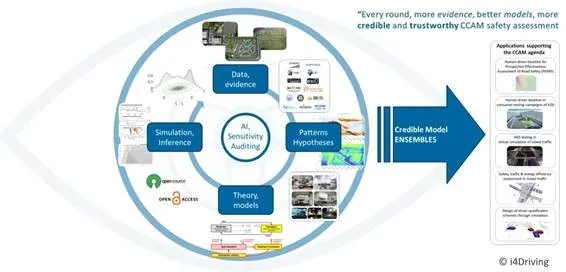I4Driving - Integrated 4D driver modelling under uncertainty
Typ of project: Funding from the European Union’s Horizon Europe research and innovation programme
Fields of expertise: Traffic Flow Theory (TFT), Human Factors (HF), Road Safety (SAF), Driving Simulation (DS)
Contact person: Tianyu Tang
Project duration: 10/2022 - 10/2025
Consortium
The coordinator is the Panteia B.V.
Projectpartner are
Universita degli Studi di Napoli Federico ii (UNINA), Aimsun Slu, Technische Universiteit Delft (TU Delft), Statens Vag- och Transportforskningsinstitut (VTI), Centro Tecnológico de Automoción de Galicia (CTAG), ZF Friedrichshafen AG (ZF), Dienst Wegverkeer (RDW),Technische Hochschule Aschaffenburg (TH AB),Consiglio Nazionale delle Ricerche (CNR),Denso Automotive Deutschland GmbH (DNDE), Lehrstuhl für Verkehrstechnik (Technische Universität München), Cyber-Physical Systems Group (Prof. Althoff, Technische Universität München)
Objective
The vision of i4Driving is to lay the foundation for a new industry-standard methodology to establish a credible and realistic human road safety baseline for virtual assessment of CCAM systems. The two central ideas we propose are (1) a multi-level, modular and extendable simulation library that combines existing and new models for human driving behavior; in combination with (2) an innovative cross-disciplinary methodology to account for the huge uncertainty in both human behaviors and use case circumstances. This rigorous treatment of the uncertainty is crucial to assess how much of our confidence in model inputs, parameters, and structure is justified. It also makes explicit how experts from different disciplines judge the outcomes and how justified the underlying assumptions really are. Our consortium combines all the expertise needed to develop this methodology (e.g. traffic engineering, human factors, data & computer science). We have the experimental means to gather the evidence beyond the state-of-art needed to realistically simulate (near) accidents in multi-driver scenarios (access to many data sources, advanced driving simulators, and field labs). We have a strong international network to collaborate with and harmonize our approach with academic and professional partners in e.g. the US (NADS facility); Australia (UQ advanced driving simulator and TRACSLab connected driving simulator facilities), China (Tongji Univ. 8-dof driving simulator and large-scale field lab) and Japan (NTSEL). Finally, we have all the relevant partners on-board to test and apply the methodology (Universities and research labs, OEMs and Tier 1, vehicle regulators, type-approval authorities, standardization institutes, insurance companies). i4Driving offers a proposition for the short and the longer term: a set of building blocks that pave the way for a driving license for AVs.
Vision
The overarching objective is to deliver a new library of credible models of heterogeneous human driver behaviors which provides a human road safety baseline for CCAM virtual assessment.
A new library doesn’t mean new models.
It means a combination of models, suitable and valid for both scenario-based and traffic-based safety assessment, which bring the heterogeneity and complexity of the road traffic system into simulation. Adding sufficient heterogeneity does justice to the diversity of human driving behaviors and drives the occurrence of both “uncritical” and safety critical situations in daily traffic. Sufficient system complexity is needed to make a robust and meaningful analysis of road safety.

